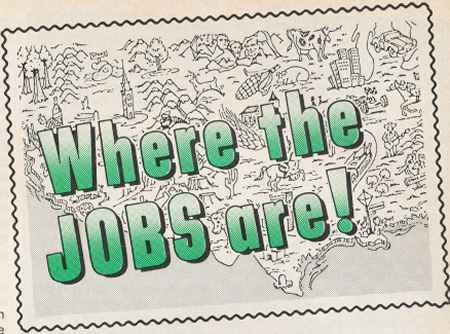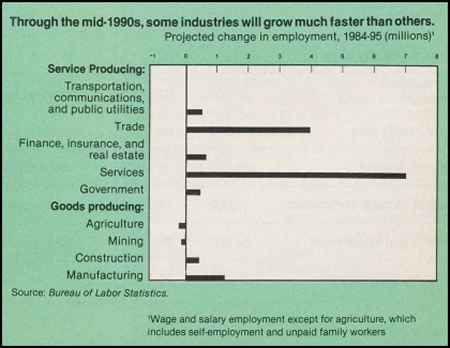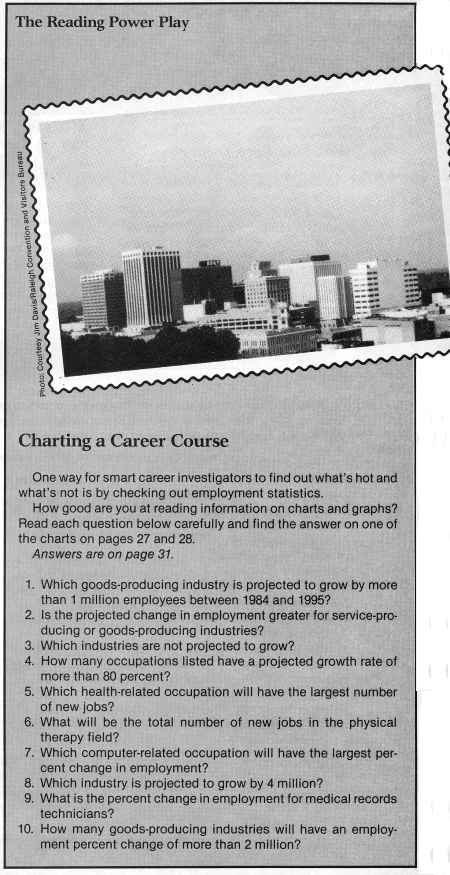Where in the world
will you work?
If you can choose
to live in an area
of the U.S. where the
numnber of jobs
is growing, where
should you go?

|
Where in the world will you work? If you can choose to live in an area of the U.S. where the numnber of jobs is growing, where should you go? |
 |
|
If the country's top expert in how jobs are created is on the money, you are more apt fo find a job, in the '90's, near a
research-oriented university. No one can predict with certainty whether an area of the country will be a job loser or winner. But David L. Birch is as qualified as anyone to point out which places are most likely to offer a rich job market. Birch: directs the regional change program at Massachusetts Institute of Technology (MIT) authored the just-published |
The area must be near a major jet airport----and should not be tiny or isolated. Service specialists, such as attorneys, printers, graphic designers, and business lawyers, should be close at hand. Local Government officials should be efficient, with good schools and other services. An example. Cambridge, Massachusetts, is a hgh tech center that has created about 20,000 jobs since 1980----more than the total job growth in 13 other states. Just 20 years ago, |
Cambridge was a town with a few old factories. Cambridge also is near MIT. Birch says that industries hatch near university laboratories------if the area has the qualities listed above. Companies are born when the best and the brightest begin a business----and bright people tend to be found around university research centers. The area also has to offer a lifestyle that workers won't want to leave. Climate and culture are key considerations. |
|
Job Creation in America (1987; Free Press); heads a Cambridge economic and marketing consulting company, Cognetics, Inc.; has tracked, and recorded on computer tape, the 17-year history of millions of businesses. He knows why business blooms----or shrinks. So where will tomorrow's jobs be found? Birch points out tha the job market is best in places where many firms are just starting up or are growing. Here's a spot profile of the kind of locality that "grows Jobs"; |
 |
|
Who's Hiring...and Where? Which regions are in a growth mode? Based on data collected by the U.S. Departments of Labor and Commerce, and on research reported in a recent issue of Fortune one of the following could become your kind of town; Job growth in Atlanta, Georgia, surpasses almost every other big city, but most of the newest growth is on the fringes of the city, rather than downtown. The population of Austin, Texas, grew by 30 percent tetween 1980 and 1985. Austin has close ties to the University of Texas and is teeming with young businesses. The area around Boston, |
Massachusetts, boasts the largest concentration of colleges in the country and has many young, fast-growing companies with university ties. The Commerce Department reports that Los Angeles, will be the country's number-one job center by the end of the '90's. Raleigh-Durham, North Carolina, with three major universities, also boasts the first major research park----Research Triangle Park----which funds research money to the schools. More than 50 research labs are found there. Ghis is a partila list. And, of course, not every kind of occupaton will be in demand in these cities. But if you detect that the growth in jobs seems to walk |
on the warm side----in the South and West, youv'e seen the trend Which Jobs Will Be on the Grow? When the population booms in one area, and shrivels in another, the demands for workers shifts, too. For those places where jobs are generally on the rise, for example, demand for public services and construction is likely to increase. With more people looking for jobs, however, competition is greater. Employment is expected to increase much faster in service-producing industries than in goods-producing industries. Service-related jobs include hotels, barber shops, automobile repair shops, hospitals, |
 |
|
engineering firms, and nonprofit organizations. According to the U.S. Department of Labor, employment in service industries is expected to increase 30 percent and provide more
new jobs than any other sector. The Department of Labor also looks for substantial increase in jobs in health services, engineering, legal, social, and accounting services. Because elementary school enrollments are increasing, employment of elementary school teachers is expected to grow rapidly. Employment in most health occupations will grow as the population grows----especially as the number of older people increases. Registered nurses and nursing aides and orderlies will be in far greater demand. Physicians, dentists, and veterinarians, however, may expect unprecedented competition due to the large number of newly trained practitioners entering those fields every year. Beth Kaima, an academic counselor at Pasadena City College, says, "I'm more worried about whether they (students) can spell and read and write, than what courses they should take to train them for a job in the future. Today you see people jump form one career to another....Once you learn to think and solve problems, you're more apt to be able to adapt when your job changes." |
 |
from Ralph Cooper, April 24, 2008 |


|